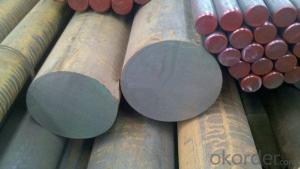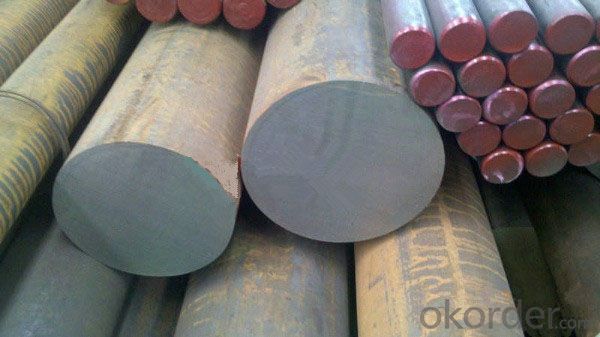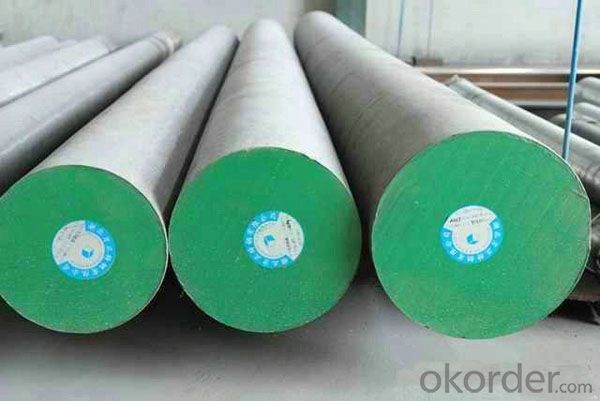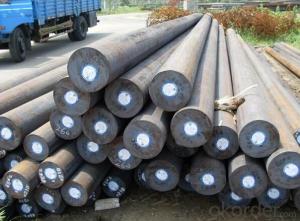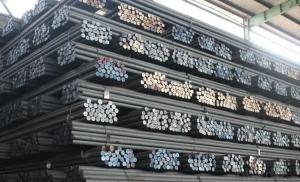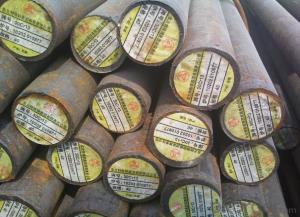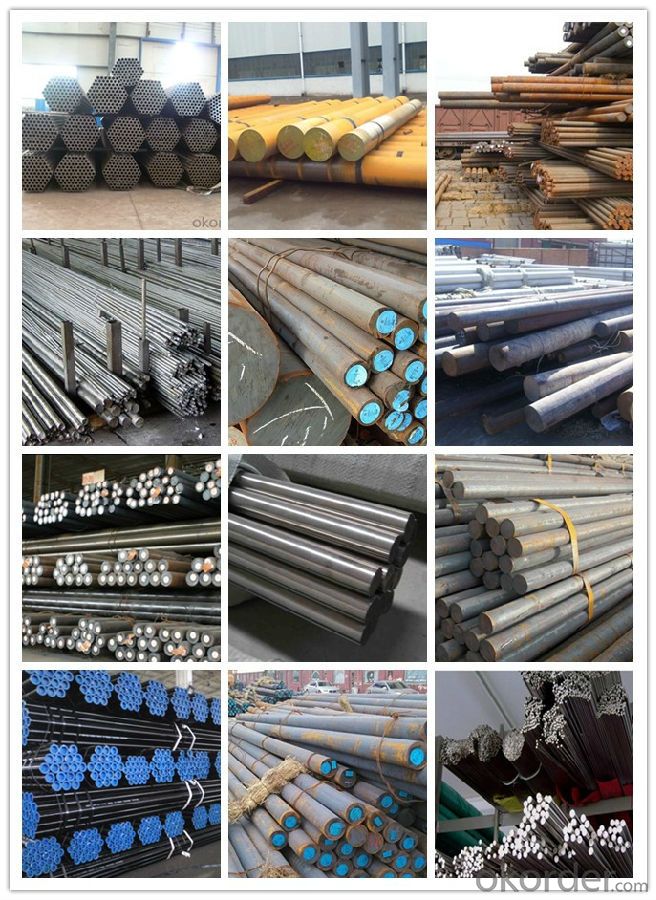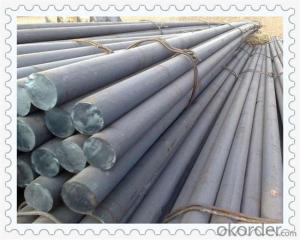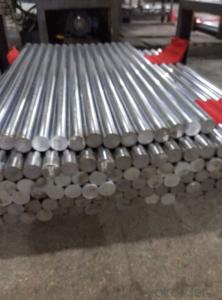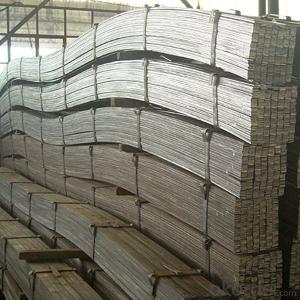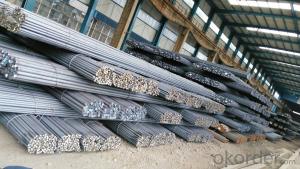Mold Material AISI D2 Hot Rolled Steel Round Bar
- Loading Port:
- China main port
- Payment Terms:
- TT OR LC
- Min Order Qty:
- 30 m.t.
- Supply Capability:
- 10000 m.t./month
OKorder Service Pledge
OKorder Financial Service
You Might Also Like
Specification
Mold material AISI D2 hot rolled steel round bar
Description:
Ledeburitic chromium cold work tool steel; with very small hardening deformations, very wear resistant, less resistant to impacts than NC11 / 1.2080, with good ductility, good cutting properties, much harder than NC10 and NC11/1.2080 due to content of molybdenum and vanadium .
Chemical composition:
Country | Steel NO. | C | Si | Mn | Cr | Mo | V | P | S | Other |
USA AISI | D2 | 1.40-1.60 | 0.30-0.50 | 0.30-0.50 | 11.0-13.0 | 0.70-1.20 | (0.80) | ≤0.025 | ≤0.025 | Co:0.60 |
Delivery condition:
Hot rolled or forging
EAF or ESR material
Black or machined surface
Available sizes:
Round bar size: 20-500mm
Thickness: 20-300mm
Width: 205-610mm
Length: 2000-5800mm
Heat Treatment:
1) Quenching temperature: 1000--1040°C
Cooling Medium: oil-cooling or air-cooling
Tempering temperature: 180-200°C, by two times
Tempering Hardness: ≥63.0HRC
2) Quenching temperature: 1060--1080°C
Cooling Medium: oil-cooling or air-cooling
Tempering temperature: 500-540°C, by two times
Tempering Hardness: ≥59.0-61.0HRC
Application:
High performance cutting tools, broaches, milling cutters, reamers, blanking dies, dies, punches, rolling rolls, tools for cutting paper, marble and plastics, cold stamping and extruding tools .
Product show
Workshop show
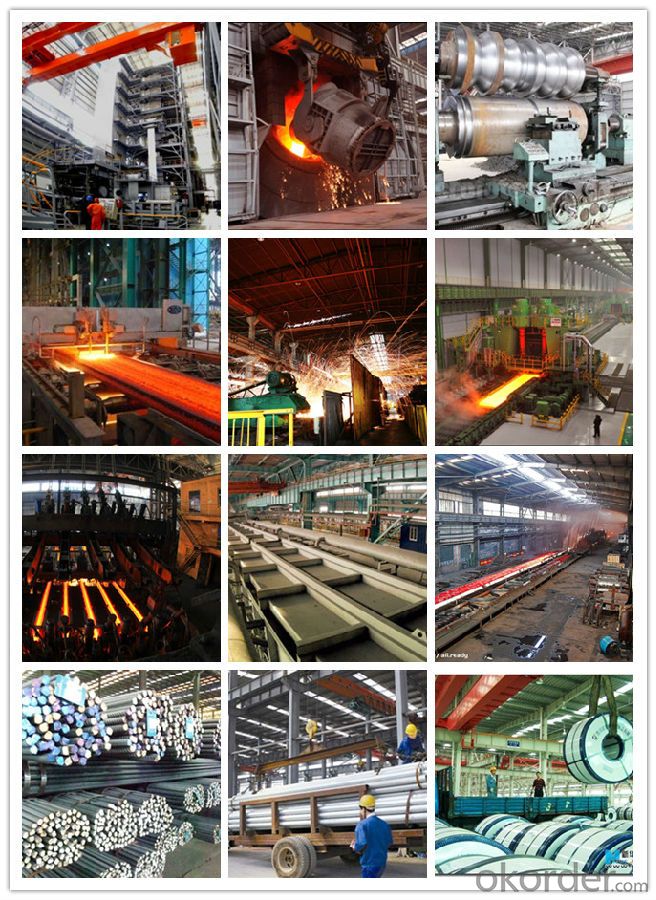
Shipping
1. FedEx/DHL/UPS/TNT for samples, Door-to-Door;
2. By Air or by Sea for batch goods, for FCL; Airport/ Port receiving;
3. Customers specifying freight forwarders or negotiable shipping methods!
Delivery Time: 3-7 days for samples; 5-25 days for batch goods.
Payment Terms
1.Payment: T/T, L/C, Western Union, MoneyGram,PayPal; 30% deposits; 70% balance before delivery.
2.MOQ: 1pcs
3.Warranty : 3 years
4.Package Informations: 1) EXPORT, In 20 feet (GW 25 ton) or 40 feet Container (GW 25 ton)
2)as customer's requirement
Why choose us?
(1) The leading exporter in China special steel industry.
(2) Large stocks for various sizes, fast delivery date.
(3) Good business relationship with China famous factories.
(4) More than 7 years steel exporting experience.
(5) Good after-sales service guarantee.
- Q: Can special steel be used in the defense sector?
- Indeed, in the defense sector, special steel finds itself as a viable option. Special steel, which encompasses alloys or compositions designed with specific attributes such as high strength, hardness, resistance to corrosion, or heat resistance, proves to be suitable for a range of defense applications. These applications include the construction of armored vehicles, naval vessels, aircraft, and weaponry. Within the defense sector, special steel serves as a valuable resource for manufacturing components and structures necessitating exceptional strength and durability. For instance, it can be utilized to produce armor plates for tanks and armored vehicles, which must endure high impact and ballistic threats. Additionally, special steel can be employed in the construction of naval vessels, providing corrosion resistance and enhancing overall structural integrity. Furthermore, the defense industry heavily relies on special steel for manufacturing aircraft parts and weaponry. Aircraft components, such as landing gear, engine parts, and structural elements, demand materials of high strength to ensure safe and reliable operation. Special steel alloys fulfill this requirement by providing the necessary strength and resistance to extreme conditions, including high temperatures and pressures, making them an ideal choice for these applications. Moreover, special steel plays a vital role in the production of various types of weapons, such as firearms and blades. Its exceptional strength and hardness properties render it suitable for manufacturing gun barrels, bulletproof vests, and knives employed by military personnel. To summarize, special steel holds significant value within the defense sector due to its exceptional properties, including strength, hardness, corrosion resistance, and heat resistance. Its extensive applications in the construction of armored vehicles, naval vessels, aircraft, and weaponry ensure the safety, durability, and effectiveness of military equipment.
- Q: How does special steel resist oxidation at high temperatures?
- Due to the presence of specific alloying elements and a carefully controlled manufacturing process, special steel is able to resist oxidation at high temperatures. When exposed to oxygen in the air, alloying elements like chromium, nickel, and aluminum form a protective oxide layer on the steel's surface. This layer acts as a barrier, preventing further oxidation. Of these alloying elements, chromium is particularly effective in forming a stable and dense chromium oxide layer. This layer serves as a self-healing mechanism, meaning that if it becomes damaged or scratched, it will quickly regenerate and continue to protect the steel from oxidation. The manufacturing process of special steel involves precise control of composition and heat treatment. This ensures that the steel has a fine and uniform microstructure, minimizing the presence of impurities or defects that could speed up oxidation. Moreover, the steel often undergoes various heat treatments, such as annealing or quenching, which further enhance its resistance to oxidation. In conclusion, the combination of alloying elements, controlled composition, and specific manufacturing processes allow special steel to withstand oxidation at high temperatures. This makes it an ideal choice for applications in industries like aerospace, power generation, and petrochemical.
- Q: What are the main applications of special steel in the power storage industry?
- Special steel is widely used in the power storage industry for various applications. One of the main uses is in the manufacturing of battery components, such as battery casings, terminals, and connectors, due to its excellent corrosion resistance and high strength. Special steel is also utilized in the production of power transmission and distribution equipment, including transformers, generators, and turbines, where its superior mechanical properties and durability ensure reliable and efficient power generation and transmission. Additionally, special steel is employed in the construction of power storage structures, such as tanks and containers, providing long-lasting protection against environmental factors and maintaining the integrity of stored energy.
- Q: How does special steel perform in high-pressure and high-temperature environments?
- Special steel is specifically designed to perform exceptionally well in high-pressure and high-temperature environments. It possesses unique properties that enable it to withstand extreme conditions without undergoing deformation, corrosion, or failure. One of the primary characteristics of special steel is its high strength. It is engineered to have superior mechanical properties, such as excellent tensile strength, which allows it to resist the immense pressure exerted on it in high-pressure environments. This strength ensures that the steel can maintain its structural integrity and not buckle or collapse under the immense force. Furthermore, special steel is highly resistant to corrosion and oxidation, even at high temperatures. This resistance is crucial in high-temperature environments where the presence of hot gases, steam, or caustic chemicals can cause regular steel to degrade rapidly. Special steel's resistance to corrosion and oxidation ensures its longevity and reliability, making it an ideal choice for applications in such challenging conditions. Additionally, special steel exhibits excellent heat resistance. It can withstand extreme temperatures without losing its mechanical properties, such as strength and hardness. This characteristic is crucial in high-temperature environments where regular steel would weaken, soften, or even melt. Special steel's ability to maintain its structural stability even in extreme heat ensures the safety and reliability of equipment and structures operating in such conditions. Moreover, special steel is known for its excellent thermal conductivity. This property allows it to efficiently transfer heat away from the high-temperature environment, preventing localized hotspots and thermal stress. By effectively dissipating heat, special steel ensures the overall stability and performance of equipment and structures under high-pressure and high-temperature conditions. In summary, special steel performs exceptionally well in high-pressure and high-temperature environments due to its high strength, resistance to corrosion and oxidation, heat resistance, and excellent thermal conductivity. These properties make special steel a reliable and durable material for various applications, including power generation, oil and gas exploration, aerospace engineering, and many more.
- Q: What are the properties of wear-resistant steel?
- Wear-resistant steel possesses several properties that make it suitable for withstanding wear and abrasion. These properties include high hardness, toughness, and strength, which help in resisting deformation, chipping, and cracking. Additionally, wear-resistant steel also exhibits excellent corrosion resistance, enabling it to withstand exposure to harsh environments without deteriorating. These properties make wear-resistant steel a popular choice for applications that involve heavy machinery, mining equipment, cutting tools, and industrial components subjected to constant wear and tear.
- Q: How is electrical steel used in the production of transformers and motors?
- Electrical steel is commonly used in the production of transformers and motors due to its unique magnetic properties. It is used to construct the cores of transformers and the stators and rotors of motors. The high magnetic permeability and low electrical resistance of electrical steel help in efficiently transferring and converting electrical energy. Additionally, its low core losses and hysteresis make it ideal for reducing energy wastage and enhancing the overall performance of these electrical devices.
- Q: How does special steel perform in pharmaceutical applications?
- Special steel is highly valued in pharmaceutical applications due to its unique properties and characteristics. It offers excellent corrosion resistance, which is crucial in pharmaceutical environments where chemical substances and aggressive cleaning agents are commonly used. This corrosion resistance ensures that the steel remains durable and maintains its integrity over time. Additionally, special steel is known for its high strength and durability, making it suitable for applications that require heavy loads or frequent use. This strength allows the steel to withstand the rigorous demands of pharmaceutical processes, such as mixing, grinding, and sterilization, without compromising its structural integrity. Another key advantage of special steel in pharmaceutical applications is its hygienic properties. Special steel is highly resistant to bacterial growth and is easy to clean, making it ideal for environments where cleanliness and sterility are of utmost importance. The smooth surface of special steel prevents the accumulation of dirt, bacteria, and other contaminants, reducing the risk of contamination and ensuring the safety and quality of pharmaceutical products. Moreover, special steel offers excellent temperature resistance, allowing it to withstand extreme temperatures and thermal cycling typically encountered in pharmaceutical processes. This thermal stability ensures that the steel retains its mechanical properties and dimensional stability, even under fluctuating temperature conditions. Overall, special steel's corrosion resistance, high strength, hygienic properties, and temperature resistance make it a reliable and versatile material for pharmaceutical applications. Its performance in these demanding environments contributes to the production of safe and high-quality pharmaceutical products.
- Q: What are the different mining grades of special steel?
- Special steel refers to steel alloys that are specifically engineered for applications that require exceptional strength, durability, corrosion resistance, or other unique properties. The mining industry relies heavily on special steel for various components, tools, and equipment used in mining operations. There are several different mining grades of special steel, each with its own specific properties and characteristics. These grades are typically categorized based on their chemical composition, mechanical properties, and intended use in mining applications. Some common mining grades of special steel include: 1. High-strength Low Alloy (HSLA) Steel: HSLA steel is known for its superior strength and toughness, making it ideal for heavy-duty mining equipment and machinery. It offers excellent weldability and corrosion resistance, making it suitable for harsh mining environments. 2. Stainless Steel: Stainless steel is widely used in mining due to its excellent corrosion resistance and ability to withstand high temperatures. It is commonly used in mining equipment such as pipes, fittings, and tanks where resistance to corrosion and abrasion is essential. 3. Tool Steel: Tool steel is specifically designed for use in cutting, drilling, and shaping tools used in mining operations. It offers high hardness, wear resistance, and toughness, making it suitable for demanding applications such as drilling bits, hammers, and cutting tools. 4. Wear-resistant Steel: Wear-resistant steel is engineered to withstand abrasive conditions and reduce wear and tear in mining equipment. It is commonly used in mining buckets, conveyor belts, and crushers to prolong their service life and minimize maintenance. 5. Heat-resistant Steel: Heat-resistant steel is essential for mining applications that involve high temperatures, such as smelting and refining processes. It retains its strength and structural integrity even at elevated temperatures, reducing the risk of equipment failure and ensuring operational efficiency. 6. Corrosion-resistant Steel: Corrosion-resistant steel is used extensively in mining operations where exposure to corrosive substances, such as acids or seawater, is common. It prevents rusting and degradation, prolonging the lifespan of mining equipment and structures. It is important to note that the specific mining grades of special steel may vary depending on the manufacturer and the intended use. To ensure the best performance and suitability for mining applications, it is recommended to consult with steel manufacturers or industry experts who can provide guidance on selecting the appropriate grade for specific mining requirements.
- Q: What are the common heat treatment methods used for special steel?
- There are several common heat treatment methods used for special steel to improve its mechanical properties and enhance its performance. Some of these methods include: 1. Annealing: This process involves heating the steel to a specific temperature and then cooling it slowly to relieve internal stresses and create a refined microstructure. Annealing helps to improve the machinability and ductility of the steel. 2. Normalizing: Normalizing is a heat treatment method that involves heating the steel to a temperature above its critical point and then cooling it in still air. This process helps to refine the grain structure of the steel, improve its toughness, and enhance its strength. 3. Quenching: Quenching is a rapid cooling process that involves immersing the steel in a quenching medium, such as water, oil, or polymer. This method is used to increase the hardness and strength of the steel by forming a hard martensitic structure. However, quenching can also introduce internal stresses and reduce the steel's toughness, so it is often followed by tempering. 4. Tempering: Tempering is a heat treatment method that involves reheating the quenched steel to a specific temperature and then cooling it gradually. This process helps to relieve internal stresses, reduce hardness, and improve the toughness and ductility of the steel. Tempering also helps to enhance the steel's resistance to brittle fracture. 5. Austempering: Austempering is a heat treatment method that involves quenching the steel to a temperature just above its martensitic transformation range and then holding it at this temperature until the austenite transforms into bainite. This process produces a unique microstructure that provides a combination of high strength and good toughness. 6. Martempering: Martempering is similar to austempering, but the steel is quenched to a temperature just below its martensitic transformation range and then held at this temperature until the transformation is complete. Martempering produces a microstructure with improved strength and toughness compared to conventional quenching. These heat treatment methods are commonly used for special steel to tailor its properties to specific applications and requirements. The choice of method depends on factors such as the desired mechanical properties, the steel's composition, and the intended use of the final product.
- Q: How does special steel perform in heat treatment applications?
- When it comes to heat treatment applications, special steel is specifically engineered to excel. Unlike regular steel, special steel is enriched with specific elements that enhance its heat resistance and improve its mechanical properties. Through processes like annealing, quenching, tempering, or hardening, special steel undergoes structural changes that result in increased strength, hardness, toughness, and wear resistance. The exceptional performance of special steel in heat treatment applications can be attributed to its unique alloying elements, including chromium, molybdenum, nickel, and vanadium. These elements create various carbides, nitrides, or intermetallic compounds during heat treatment, contributing to the overall enhancement of the steel's properties. For example, chromium forms chromium carbides, which boost hardness and corrosion resistance, while molybdenum and vanadium enhance hardenability and wear resistance. Furthermore, special steel exhibits remarkable dimensional stability during heat treatment. It possesses a low tendency to warp or distort, ensuring that the final product retains its desired shape and dimensions. This dimensional stability is especially crucial for applications that require precise tolerances or intricate designs. Moreover, special steel offers consistent and dependable heat treatment results. Its composition and microstructure are meticulously controlled, guaranteeing a predictable response to heat treatment processes. This enables manufacturers to consistently achieve the desired mechanical properties, minimizing the risk of inconsistencies or failures in the end product. In conclusion, special steel excels in heat treatment applications. Its exceptional alloying elements, dimensional stability, and reliable heat treatment response make it an ideal choice for applications that necessitate improved strength, hardness, toughness, and wear resistance. Whether it is for automotive components, tooling, or industrial machinery, special steel delivers dependable and enhanced performance after undergoing heat treatment processes.
Send your message to us
Mold Material AISI D2 Hot Rolled Steel Round Bar
- Loading Port:
- China main port
- Payment Terms:
- TT OR LC
- Min Order Qty:
- 30 m.t.
- Supply Capability:
- 10000 m.t./month
OKorder Service Pledge
OKorder Financial Service
Similar products
Hot products
Hot Searches
Related keywords
